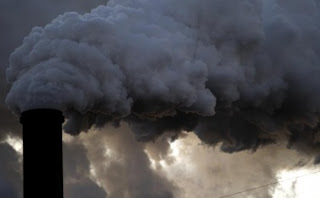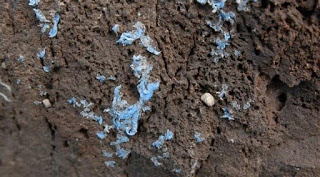American Medical Association: “climate change is #1 public health challenge”, 2004 Gulf spill larger than previously believed, Shark tournaments kill vulnerable sharks, Scientists discover huge aquifer below Atlantic, Shark graffiti, GeoPark gives up on Amazon drilling and more…
1. Prominent U.S. medical associations call upon elected officials to recognize that climate change is ‘greatest public health challenge of the 21st century’ and to react accordingly
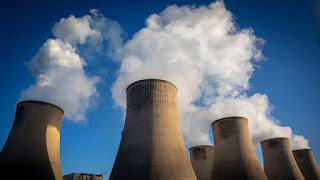 Dozens of medical and public health groups are calling on elected officials and candidates to commit to an agenda to combat climate change.“The health, safety and well-being of millions of people around the world have already been harmed by human-caused climate change, and health risks in the future are dire without urgent action to fight climate change,” the 74 groups, including the American Medical Association and the American Heart Association, said in a letter Monday.
Dozens of medical and public health groups are calling on elected officials and candidates to commit to an agenda to combat climate change.“The health, safety and well-being of millions of people around the world have already been harmed by human-caused climate change, and health risks in the future are dire without urgent action to fight climate change,” the 74 groups, including the American Medical Association and the American Heart Association, said in a letter Monday.
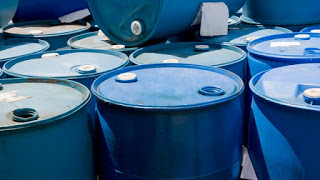 The Gulf of Mexico oil spill that began in 2004 is releasing far more oil than the well owner claims, according to a federal study released Monday. The report, by two scientists at the National Oceanic and Atmospheric Administration (NOAA) and a Florida State University professor, found that up to 108 barrels per day — more than 4,500 gallons — flow from the site of the nearly 15-year-long spill, which was triggered by Hurricane Ivan. Taylor Energy claims that only one drop of oil per minute is being released from a small area covered in mud, amounting to less than three gallons each day.
The Gulf of Mexico oil spill that began in 2004 is releasing far more oil than the well owner claims, according to a federal study released Monday. The report, by two scientists at the National Oceanic and Atmospheric Administration (NOAA) and a Florida State University professor, found that up to 108 barrels per day — more than 4,500 gallons — flow from the site of the nearly 15-year-long spill, which was triggered by Hurricane Ivan. Taylor Energy claims that only one drop of oil per minute is being released from a small area covered in mud, amounting to less than three gallons each day.
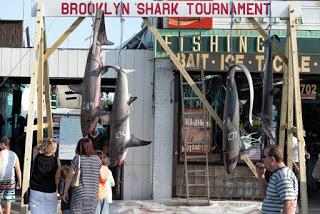 As dawn cracks the Saturday sky above Sheepshead Bay, more than 30 boats set out for the open sea. The sixth annual Brooklyn Shark Tournament has begun. The vessels will return in the afternoon to hang huge sharks from a giant scaffold in front of bait-and-tackle shop Stella Maris, drawing a crowd and slowing traffic to a crawl. At stake? More than $50,000 in prize money. Captains arrived the night before, parking their trucks along Emmons Avenue and heading inside the venerable bait shop to register their boats for Brooklyn’s only shark tournament. Crowding into the narrow aisle of the shop, between racks of rods and reels, they pay their fee in crisp hundreds from calloused hands.
As dawn cracks the Saturday sky above Sheepshead Bay, more than 30 boats set out for the open sea. The sixth annual Brooklyn Shark Tournament has begun. The vessels will return in the afternoon to hang huge sharks from a giant scaffold in front of bait-and-tackle shop Stella Maris, drawing a crowd and slowing traffic to a crawl. At stake? More than $50,000 in prize money. Captains arrived the night before, parking their trucks along Emmons Avenue and heading inside the venerable bait shop to register their boats for Brooklyn’s only shark tournament. Crowding into the narrow aisle of the shop, between racks of rods and reels, they pay their fee in crisp hundreds from calloused hands.
Read more from “Brooklyn Eagle”
and
Watch Mako Mania promo video
———————————————–
4. Scientists discover a gigantic freshwater aquifer below the Atlantic
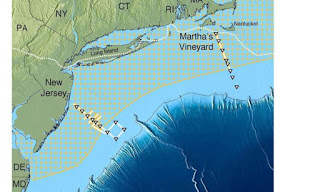 In a new survey of the sub-seafloor off the U.S. Northeast coast, scientists have made a surprising discovery: a gigantic aquifer of relatively fresh water trapped in porous sediments lying below the salty ocean. It appears to be the largest such formation yet found in the world. The aquifer stretches from the shore at least from Massachusetts to New Jersey, extending more or less continuously out about 50 miles to the edge of the continental shelf. If found on the surface, it would create a lake covering some 15,000 square miles. The study suggests that such aquifers probably lie off many other coasts worldwide, and could provide desperately needed water for arid areas that are now in danger of running out.
In a new survey of the sub-seafloor off the U.S. Northeast coast, scientists have made a surprising discovery: a gigantic aquifer of relatively fresh water trapped in porous sediments lying below the salty ocean. It appears to be the largest such formation yet found in the world. The aquifer stretches from the shore at least from Massachusetts to New Jersey, extending more or less continuously out about 50 miles to the edge of the continental shelf. If found on the surface, it would create a lake covering some 15,000 square miles. The study suggests that such aquifers probably lie off many other coasts worldwide, and could provide desperately needed water for arid areas that are now in danger of running out.
———————————————-
 MEXICO CITY (Reuters) – Mexico’s oil regulator on Tuesday approved a $97 million plan for drilling in an offshore area operated by British supermajor BP in the southern Gulf of Mexico. The four-year exploration plan approved by the national hydrocarbons commission (CNH) covers a 700,000 square kilometer shallow water block, located north of the coast of Tabasco state. BP won the rights to drill last June, along with its partner French oil major Total. BP’s contract is one of over 100 awarded since a sweeping energy reform was finalized in 2014, championed by Mexico’s previous government in a bid to reverse years of declining crude production.
MEXICO CITY (Reuters) – Mexico’s oil regulator on Tuesday approved a $97 million plan for drilling in an offshore area operated by British supermajor BP in the southern Gulf of Mexico. The four-year exploration plan approved by the national hydrocarbons commission (CNH) covers a 700,000 square kilometer shallow water block, located north of the coast of Tabasco state. BP won the rights to drill last June, along with its partner French oil major Total. BP’s contract is one of over 100 awarded since a sweeping energy reform was finalized in 2014, championed by Mexico’s previous government in a bid to reverse years of declining crude production.
6. Shark graffiti – newest fad?
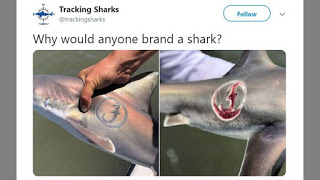 A man has been arrested after sharks with brands burned into their skin were found by Lowcountry fishermen, according to the South Carolina Department of Natural Resources, or SCDNR. An SCDNR spokesman said an Awendaw man was charged in the branding of sharks, WTMA reported. Sharks were found in May bearing marks similar to brands scorched on cattle and horses, according to a tweet from Tracking Sharks. SCDNR launched an investigation after pictures of sharks with the brand circulated on social media, WCSC reported. The brand seared into the shark’s skin was a circle with a shape inside that could be a cursive letter, a fish hook or even a shark.
A man has been arrested after sharks with brands burned into their skin were found by Lowcountry fishermen, according to the South Carolina Department of Natural Resources, or SCDNR. An SCDNR spokesman said an Awendaw man was charged in the branding of sharks, WTMA reported. Sharks were found in May bearing marks similar to brands scorched on cattle and horses, according to a tweet from Tracking Sharks. SCDNR launched an investigation after pictures of sharks with the brand circulated on social media, WCSC reported. The brand seared into the shark’s skin was a circle with a shape inside that could be a cursive letter, a fish hook or even a shark.
7. GeoPark withdraws request to drill for oil in the Peruvian Amazon
GeoPark has withdrawn its request for an environmental permit to begin drilling for crude in the Peruvian Amazon amid protests from indigenous tribes, the oil company said on Thursday. GeoPark said in a statement late on Thursday that it wanted to incorporate more information into its environmental plan for tapping Block 64 in the remote jungle region of Loreto, and planned to coordinate with authorities to resubmit it at a later date. GeoPark needs Peruvian government approval of its environmental plan before it can start operating Block 64, which it says holds 160 million barrels of crude in probable and possible reserves.
 President Donald Trump decided on Monday to add tariffs to imported solar panels. The U.S. will impose duties of as much as 30 percent on solar equipment made abroad, a move that threatens to handicap a $28 billion industry that relies on parts made abroad for 80 percent of its supply. Just the mere threat of tariffs has shaken solar developers in recent months, with some hoarding panels and others stalling projects in anticipation of higher costs.
President Donald Trump decided on Monday to add tariffs to imported solar panels. The U.S. will impose duties of as much as 30 percent on solar equipment made abroad, a move that threatens to handicap a $28 billion industry that relies on parts made abroad for 80 percent of its supply. Just the mere threat of tariffs has shaken solar developers in recent months, with some hoarding panels and others stalling projects in anticipation of higher costs.
9. Plastic is now forming crusts on rocky shores
Plastic pollution in the ocean is incredibly widespread. Globally production of plastic has ramped up in recent decades, with 320 million tons of plastic produced in 2016 alone. One of the nefarious characteristics of plastic that makes it so durables is its inability to organically degrade. Even after it has been broken down by wind and wave action (mechanic degradation) as well as rays of light (photodegradation), the plastic remains in small fragments. Ocean plastic can be found in many places – fragments can snag on branching corals and kill them, microplastics occur in Arctic ice, and plastic bags have been found at the depths of the Mariana Trench. Now, a recent study demonstrates that plastic is forming crusts (so-called “plasticrusts”) on the rocky shores of Madeira, a Portuguese archipelago in the Atlantic Ocean.
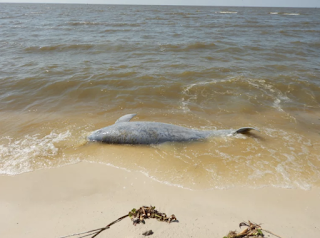 Nearly 300 dead bottlenose dolphins have washed up along the beaches of the Gulf Coast this year. While scientists can’t explain the sudden surge, some at least have theories. Since February, 282 bottlenose dolphins have been found across four states in varying degrees of death and decay, according to Erin Fougeres, a Marine Mammal Scientist at the National Oceanic and Atmospheric Administration (NOAA). Mississippi has seen the largest number of dead dolphins, with Louisiana, Florida and Alabama close behind. The NOAA has declared the phenomenon an “Unusual Mortality Event,” or UME, which means the number of dead dolphins is alarming enough to warrant an official response.
Nearly 300 dead bottlenose dolphins have washed up along the beaches of the Gulf Coast this year. While scientists can’t explain the sudden surge, some at least have theories. Since February, 282 bottlenose dolphins have been found across four states in varying degrees of death and decay, according to Erin Fougeres, a Marine Mammal Scientist at the National Oceanic and Atmospheric Administration (NOAA). Mississippi has seen the largest number of dead dolphins, with Louisiana, Florida and Alabama close behind. The NOAA has declared the phenomenon an “Unusual Mortality Event,” or UME, which means the number of dead dolphins is alarming enough to warrant an official response.
———————————————-
“Our world is swamped by harmful plastic waste. Microplastics in the seas now outnumber stars in our galaxy. From remote islands to the Arctic, nowhere is untouched. If present trends continue, by 2050, our oceans will have more plastic than fish. The message is simple: reject single-use plastic. Refuse what you can’t reuse. Together, we can chart a path to a cleaner, greener world,” said United Nations Secretary-General António Guterres. Seventy to eighty-five percent of marine litter in the Caribbean Sea comes from land, and most of it consists of plastics. Together with agrochemical run-off and domestic wastewater, it is one of three priority pollutants for the wider Caribbean region.
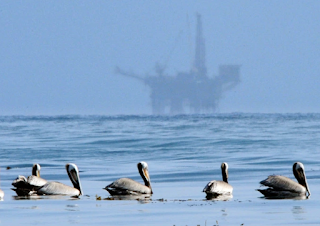 When President Trump boldly announced that he was going to expand oil drilling off coastlines across the United States, including California’s, he drew cheers from the oil industry and dread from environmentalists and coastal tourism leaders. Two years later, his plans for new drilling are hitting a potentially fatal setback: Nancy Pelosi and the Democrats who now control the House of Representatives. On Thursday, in an obscure, but key, vote, the House voted to adopt several amendments to the Department of Interior budget for next year that ban the agency from spending any money to pursue new offshore oil and gas drilling in federal waters off the Atlantic and Pacific coasts.
When President Trump boldly announced that he was going to expand oil drilling off coastlines across the United States, including California’s, he drew cheers from the oil industry and dread from environmentalists and coastal tourism leaders. Two years later, his plans for new drilling are hitting a potentially fatal setback: Nancy Pelosi and the Democrats who now control the House of Representatives. On Thursday, in an obscure, but key, vote, the House voted to adopt several amendments to the Department of Interior budget for next year that ban the agency from spending any money to pursue new offshore oil and gas drilling in federal waters off the Atlantic and Pacific coasts.
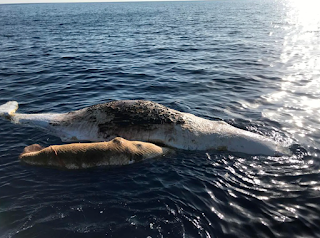 MILAN — A mother sperm whale and its baby have died after becoming tangled in a fishing net in the Tyrrhenian Sea off Italy’s western coast, an Italian environmental group reported Thursday. The Marevivo group said the Italian Coast Guard had responded to the sighting and surmised that the mother, which measured 6 meters (nearly 20 feet), died while trying to free its baby. They were found 8 miles off the coast of Palmarola Island in the Lazio region. It said part of the fishing net was found in the mother whale’s mouth while the baby while was completely covered by it.
MILAN — A mother sperm whale and its baby have died after becoming tangled in a fishing net in the Tyrrhenian Sea off Italy’s western coast, an Italian environmental group reported Thursday. The Marevivo group said the Italian Coast Guard had responded to the sighting and surmised that the mother, which measured 6 meters (nearly 20 feet), died while trying to free its baby. They were found 8 miles off the coast of Palmarola Island in the Lazio region. It said part of the fishing net was found in the mother whale’s mouth while the baby while was completely covered by it.
Sea Save Foundation is committed to raising awareness of marine conservation. The Ocean Week in Review is a team effort produced by the Sea Save staff to provide a weekly summary of the latest in marine research, policy, and news

